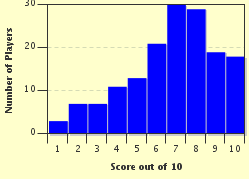Quiz Answer Key and Fun Facts
1. A classic example of a dangling participle or misplaced modifier is this one, offered by Strunk & White in "The Elements of Style":
"Wondering irresolutely what to do next, the clock struck twelve."
Why is this sentence wrong?
2. Prof. Mark Damen gives three very good examples of dangling modifiers in chapter 10 of his "A Guide to Writing in History and Classics" (2002). Which of these is the lone sentence that is correct?
3. Here is a note I received: "After reading what the editors go through to edit a quiz and make it acceptable, it is really amazing that they are so productive!"
While I agree with the sentiment, what could be done to make the misplaced modifier in this sentence not so misplaced -- ignoring any other possible errors in the sentence?
4. In "The New York Times", David Brooks wrote: "If elected, Obama's main opposition will not come from Republicans."
Is this quote an example of a misplaced modifier?
5. "Hopefully, the sun will be shining on our picnic tomorrow."
Although some grammarians contend this is wrong, others disagree. What kind of word is "hopefully" when used in this way, set apart from the rest of the sentence?
6. The word "only" is often misplaced in English usage. Imagine this scenario:
As the curmudgeonly ruler of an island country, I don't like whipper-snappers voting in elections, so I have passed a law banning youngsters under 30 from the polls. Which of these sentences will best convey my meaning?
7. "The sky being blue and cloudless, today is a good day for our picnic!"
Does this sentence present another case of a misplaced modifier? (Read carefully, please.)
8. Another classic example of a misplaced modifier is a one-liner from the comedic movie "Animal Crackers" (1930). Groucho Marx says:
"One morning I shot an elephant in my pajamas. How he got into my pajamas I'll never know."
What is the misplaced modifier here that makes this so funny?
9. I found an amusing example of a misplaced modifier when watching a silent movie starring Buster Keaton. As the young hero eloped with the farmer's daughter, he stole a horse and rode away, and a hired hand yelled this warning: "He's running away to get married with your horse!"
What does it sound like the hired hand said?
10. We'll end with one more example from "The New York Times", on the very subject of misplaced modifiers. Philip B. Corbett writes:
"Danglers come in many forms. Most often, the problem involves a descriptive phrase at the beginning of a sentence, referring to a noun or pronoun that follows. Here's the key: that noun or pronoun should come immediately after the descriptive phrase. If not, the description 'dangles,' the connection is sloppy or obscure, and the reader may be momentarily confused. Once recognized, a writer or editor can easily fix the dangler, and the result is a clearer, sharper sentence."
Which sentence, in fact, has the very sort of dangler Corbett is talking about?
Source: Author
gracious1
This quiz was reviewed by FunTrivia editor
looney_tunes before going online.
Any errors found in FunTrivia content are routinely corrected through our feedback system.

